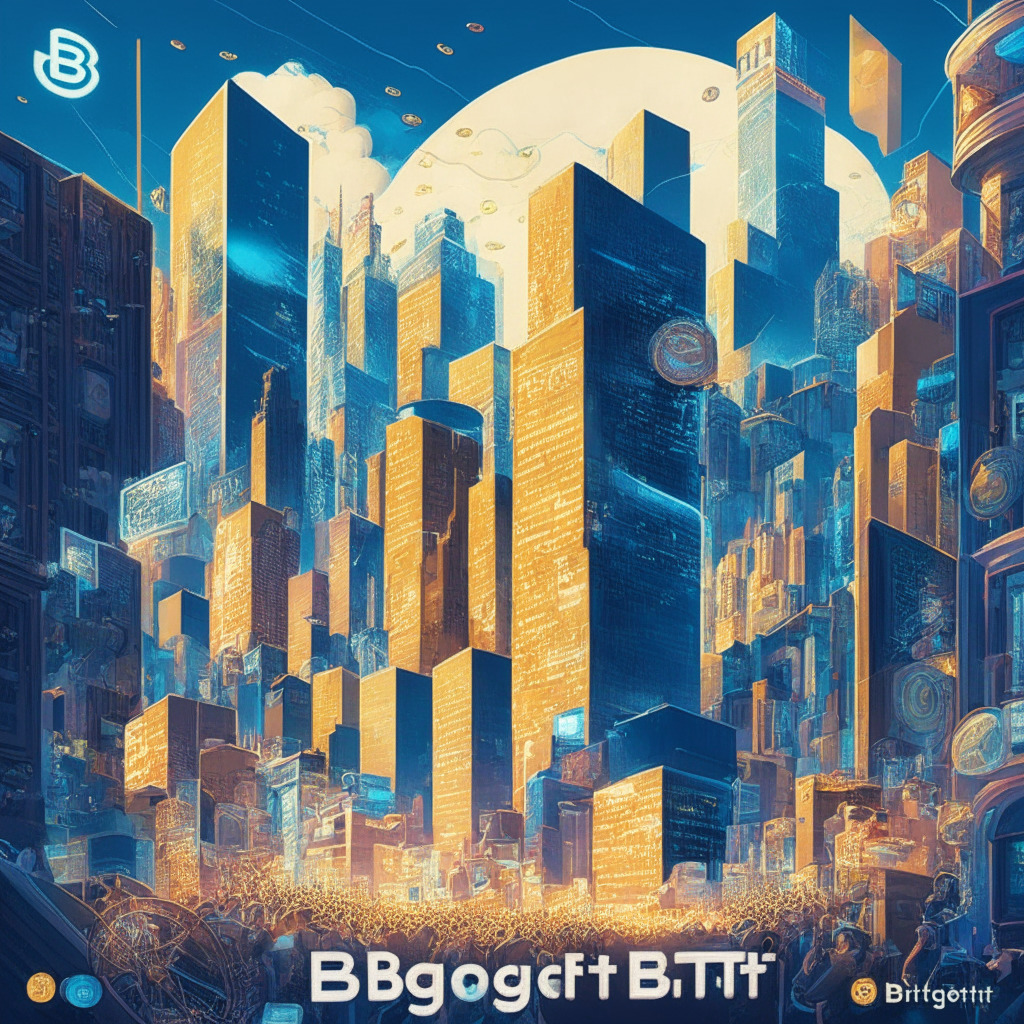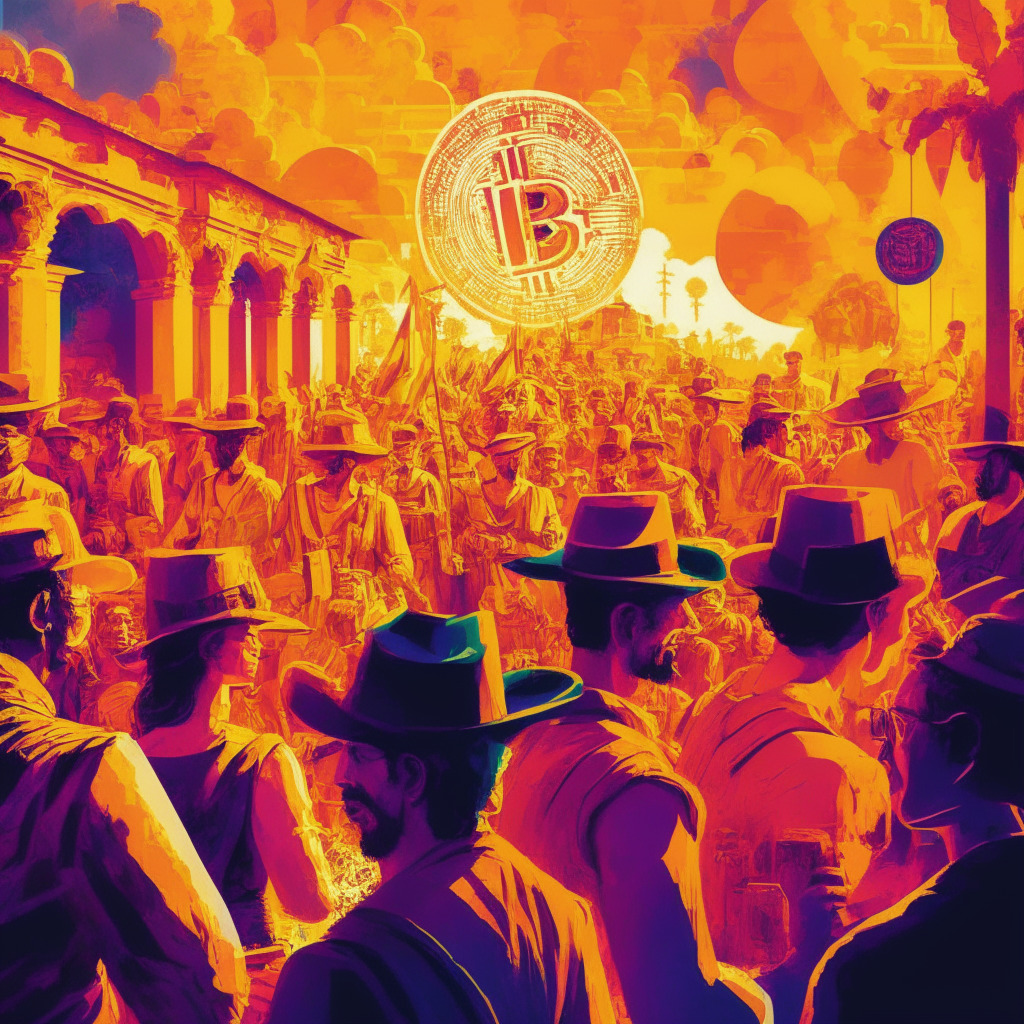The cryptocurrency community has been hit by various legal and regulatory changes recently, surrounding issues like fraudulent activities, securities violations, and money laundering investigations. These developments demonstrate the dynamic challenges faced when crypto technology interacts with traditional financial structures. For a robust future, it’s crucial that the pace of regulations matches the innovation in this field.
Search Results for: Custodia
Backpedaling or Forward Leaping: Regulatory Uncertainty Puts Crypto Adoption at Crossroads
“Key U.S companies such as Nasdaq and Citigroup reconsider their stance on crypto due to regulatory uncertainty. However, others like Societe Generale and Schroders show a continued interest in crypto. Regulatory environments in the U.S and Europe contrast, with Europe taking a more embracive stance.”
Bitget’s Path to Prominence: Growth, Copy Trading, and the Challenge of Reserve Sustainability
“Bitget, a cryptocurrency derivative exchange, surged in users due to the integration of self-custodial wallet service, Bitkeep. They now hold 8.1% market share of total trading volumes. Despite growth, concerns about reserve maintenance and volatile markets create an uncertain future.”
Nasdaq Abandons Crypto Custody Plans: A Muddle or Tipping Point for Industry?
“Nasdaq, the tech-centric US stock exchange, has halted its plans to introduce a cryptocurrency custody service, raising concerns within the crypto industry. This comes despite BlackRock’s proposal brought hope for deep institutional interest in Bitcoin and cryptocurrencies. If the regulatory status continues, it may herald a bleak future for the industry.”
Bitcoin Bulls vs Bears: The Battle at the $30,000 Mark and Spot ETF Proposals
The upcoming Bitcoin options’ expiry on Friday could reinforce the $30,000 resistance level, indicating potential control by the bears. However, the bulls might leverage spot ETF proposals under SEC scrutiny. Amidst this, the transformative power of blockchain technology remains unperturbed, despite volatile market dynamics.
Unraveling Reddit’s Bold NFT Strategy: Sweeping User Adoption or Risky Leap into Blockchain?
“Reddit’s strategy for onboarding users to its blockchain-based digital collectibles involves an easy-to-use wallet, “Reddit Vault,” and prioritizing the product’s benefits over the underlying technology. However, rapid adoption raises questions around user understanding and protection in the blockchain world.”
UK Law Commission’s Crypto Ownership Report: A Milestone or A Mirage?
“The recent Law Commission report by England and Wales addressing crypto ownership rights provides legal clarity but doesn’t address issues like developer liability. It’s viewed as a potential turning point for litigants in lawsuits against Bitcoin developers, but lawyers caution that it doesn’t encompass all legal ambiguities related to cryptocurrencies. Future legislative action is needed for more comprehensive understanding of digital assets.”
Nasdaq’s Withdrawal Shakes the Crypto World: Premising Contenders Emerging Stronger
“Nasdaq’s proposed cryptocurrency custody service has been put on hold due to regulatory ambiguity. The absence of a credible custodian like Nasdaq may impact smaller entities aiming to offer their own services. Meanwhile, cryptocurrencies like Flex Coin, Evil Pepe Coin, Stellar, Burn Kenny, and Cardano show promising signs despite potential risks inherent in a volatile market.”
Unraveling the $58 Million Deltec Scam: A Case Study for Crypto’s Regulatory Future
“The U.S. Secret Service seized multiple bank accounts from Deltec Bank, a Bahamian bank connected to crypto-industry firms. Accusations suggest these accounts played a part in international money laundering syndicates linked to crypto investment and wire fraud scams. The need for stronger regulatory oversight in the crypto world is evident.”
Unveiling Marinade Native: Revolutionizing SOL Staking on the Solana Framework
“Marinade Finance, within the Solana framework, is set to provide staking capabilities for SOL tokens. The “Marinade Native” initiative allows investors bypass the process of exchanging SOL for liquid staking tokens (LSTs), thereby mitigating smart contract risks while ensuring yields. It also guarantees that investors retain full custody of their SOL tokens.”
Scaling the Borders of Financial Freedom: Shinhan Bank Tests Stablecoin Remittances on Hedera Network
Shinhan Bank, a South Korean banking titan, completed a successful test for stablecoin remittances on Hedera’s network, allowing real-time, instantaneous settlement and foreign exchange rate integration across three currencies. This process decreases complexities and cost for cross-currency transactions, offering a solution to high intermediary bank charges in current financial structures, especially with cross-border transfers.
Ledger’s Ambitious Expansion into Latin America: A Leap of Foresight or a Gamble?
“French crypto hardware wallet creator, Ledger, is expanding into Latin America, promising to strengthen its supply chain. With crypto adoption surging, Ledger’s move could greatly benefit potential customers by providing easier product access. Plans include collaboration with a US-based logistics firm to widen the distribution network across the region.”
Bridging the Gap: Gnosis Fuses Decentralized Payments with Visa’s Traditional Channels
Gnosis is pioneering the integration of decentralized payment systems with conventional channels, launching products allowing users to spend their digital assets from wallets via Visa’s system. Gnosis Pay and Gnosis Card, a self-funded Visa debit card connected to an on-chain wallet, aim to simplify the movement of crypto-assets and reinforce the Gnosis blockchain ecosystem.
Revolutionizing Crypto Transactions: Mutiny’s Web-Based Bitcoin Wallet Pushes Boundaries
Bitcoin wallet startup, Mutiny, released a beta version of self-custodial Lightning wallet that bypasses app distributors like Apple and Google. The firm addressed Bitcoin product censorship by launching Zapple Pay, enabling Bitcoin tipping and continuous upgrades without app store restrictions. Besides this, the wallet aids in liquidity management and includes a social tipping feature via the Nostr Wallet Connect protocol.
Crypto Index Funds and ETFs: A Passive Income Powerhouse or Risky Venture?
“Cryptocurrency index funds and ETFs have gained interest for generating passive income. These replicate the performance of a specific cryptocurrency index or market segment providing diversification and low expense ratios. However, unpredictable crypto market volatility and legal risks highlight the need for investor knowledge and careful strategy.”
The Rise and Uncertainty of Centralized Stablecoins: Balancing Transparency and Dependence
Centralized stablecoins, stabilizing their price against another asset like the U.S dollar, account for 75% of all transactions on centralized crypto exchanges, with TrueUSD (TUSD) and Tether’s USDT taking significant shares. However, amid growth, controversies and transparency issues pose challenges and risks, demonstrating the crypto market’s vulnerability. The future of such stablecoins depends on addressing these vulnerabilities and embracing transparency.
Barclays versus Coinbase: A Tale of Contrasting Perspectives in the Cryptosphere
“Barclays downgraded Coinbase’s stocks from equal to underweight amidst uncertainty about the platform’s future. Despite declining metrics, Coinbase’s stocks rose following involvement in a BTC ETF application. The tug-of-war between market forces and regulatory constraints calls for prudence in cryptocurrency investments.”
Wallet Pay: Shaping the Future of In-App Crypto Payments or a Regulatory Nightmare?
Telegram’s wallet bot, Wallet, introduces a new feature, Wallet Pay, enabling encrypted in-app transactions supporting cryptocurrencies such as Bitcoin, Tether, and Toncoin. The feature is available globally, but businesses must navigate their own local crypto regulations before adopting Wallet Pay.
Ethereum Staking Landslides: How Stader Labs is Balancing the Scales
Stader Labs, a non-custodial multi-chain liquid staking platform, has expanded to Ethereum, offering superior yields on ETH staking. The platform has significantly reduced the capital commitment for node operators, promising a return rate exceeding 6%. Additionally, they aim to tackle the issue of centralization with a self-limit on their share of all ETH staked.
Celsius Vs StakeHound: A $150 Million Crypto Controversy Unravelled
Celsius, a bankrupt crypto lender, is suing StakeHound for allegedly failing to return tokens valued over $150 million. StakeHound argues they have “no obligation” to exchange proprietary stTokens or return lost Celsius ETH keys. This dispute highlights how navigating regulatory frameworks like the U.S. Bankruptcy Code can be complex in the crypto world.
Unveiling the Crypto Custody Market: Its Astounding Ascendance and Overcoming Challenges
“Crypto custody market valuation soared to $448 billion in 2022, with 120 custody service providers active as of April 2023. Despite growth, challenges remain in security and insurance coverage. Institutions are increasingly favoring self-custody solutions and digital asset custodians over exchange platforms for enhanced safety.”
Zapple Pay: Ingenious Loophole or a Move in the Crypto-Tech Giants Chess game?
Bitcoin-friendly social app Damus recently confronted Apple over the removal of a bitcoin tipping feature, deemed a violation of Apple’s guidelines. Two Bitcoin developers, Ben Carman and Paul Miller created Zapple Pay, a workaround service using emojis, restoring the “zap” feature. The fate of this creative solution remains uncertain as cryptocurrency platforms continue to challenge tech giants.
Decentralized Social Media: Empowering Users or Opening Pandora’s Box?
“DeSo is a decentralized social media system built on blockchain technology, aiming to counteract issues with traditional social media platforms. By keeping user identities, content, and networks on-chain, DeSo proposes a platform where content ownership mirrors Bitcoin’s security. However, such systems can often lack moderation, potentially leading to cyberbullying, misinformation, or misuse.”
Navigating the Crypto Landscape: Insights from a Blockchain Expert on Digital Asset Investing
“Sarah Morton, a crypto expert, emphasizes on the emerging interest of current and future generations in digital assets. She addresses key concerns around investing in crypto and offers opportunities for financial advisors to meet client needs in this sprouting terrain. Challenges like security and volatile market dynamics are diverse but navigable through apt guidance.”
Diving into Celsius Network’s Shift: Liquidation Concerns and the Ripple Effect on Crypto Markets
Celsius Network, a struggling crypto-lending firm, has alarmed investors by transferring $70 million in altcoins to various wallets following a court order. This move sparks fears of a massive sell-off and potential market volatility. Amid this, crypto consortium Fahrenheit aims to acquire Celsius, amidst increasing regulatory scrutiny in the broader crypto landscape.
Chainlink’s Proof-of-Reserves: True Transparency or Illusion of Accountability?
Chainlink’s proof-of-reserves service promises to allow crypto custodians to directly monitor real-world assets on blockchains, increasing safety and transparency for DeFi users. However, the durability of this solution is questioned as the credibility of data depends on the source, possibly masking inadequate accounting practices and reinforcing trust issues in centralized entities.
Shifting Power in Crypto: Decline in Exchange Balances and Rise in Self-Custody Trend
Goldman Sachs’s analysis indicates a substantial decrease in BTC and ETH held on exchanges in June, suggesting a shift towards self-custody among crypto holders. This trend coincides with increasing uncertainties about potential regulatory actions against cryptocurrencies and concerns about exchange security breaches.
Argus Protocol’s Success: Reflecting Institutional Trust in Blockchain Finance and DeFi
“In a significant development for blockchain finance, the Argus protocol, launched by crypto custodian Cobo, saw institutional customer funds exceed $100 million within seven days of release. This highlights growing institutional interest in decentralized finance (DeFi) and secure token storage.”
Navigating Through the Storm: Cryptocurrency Regulation, Security, and the Future of Blockchain Innovation
South Korea recently approved its first standalone digital-asset bill aiming to protect investors, integrating 19 crypto-related bills and defining digital assets. Thailand’s SEC imposed rules on digital asset service providers, focusing on investor protection, but potentially hampering financial innovation. Blockchain’s security issues remain prominent with instances of stolen NFTs and crypto miners diversifying into high-end chip demand.
Harnessing Blockchain for a More Rewarding Concert Experience: A Revolution or Intrusion?
“Invited to use the EVENTZ app, fans at a Harry Styles concert had their first experience with blockchain technology and digital wallets. This integration can revolutionize event management, establishing a rewarding system and acknowledging regular attendees. With potential rewards for purchasing tickets, engaging with content, or buying merchandise, the music industry is starting to amass exciting blockchain innovations.”
Unleashing the Power of NFTs in the Music Industry: A New Era of Artist-Fan Relationship
The concept of non-fungible token (NFT) rewards is transforming the relationship between artists and fans. For instance, at a Harry Styles concert, fans were invited to create a digital wallet on the event app, potentially for future blockchain-based benefits. This initiative empowers music enthusiasts with Web3-based reward features, providing meaningful reward for their loyalty. The ultimate aim is to streamline brand-to-fan interactions and provide transparency through blockchain technology.
Citigroup and Metaco Partnership Reconsideration: Ripple Acquisition Fallout or Strategic Play?
“Citigroup’s speculative gaze on its partnership with crypto custody firm, Metaco, fuels conjectures about the future of this collaboration. Amid the ongoing Ripple-SEC tussle, this development reemphasizes the need for strategic maneuverability and adaptability in the blockchain and cryptocurrency universe.”































